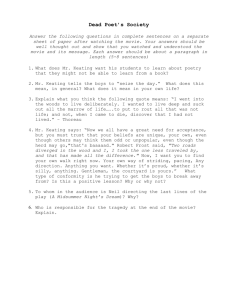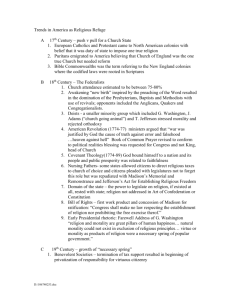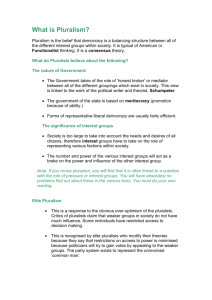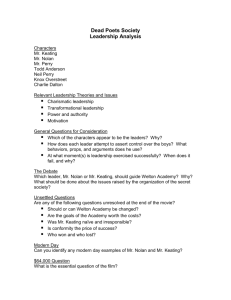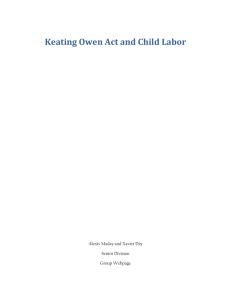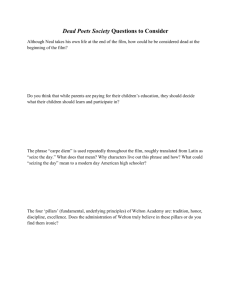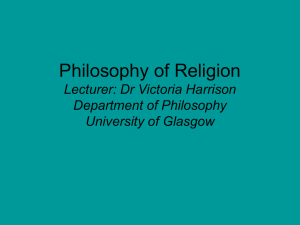Cover Sheet
advertisement
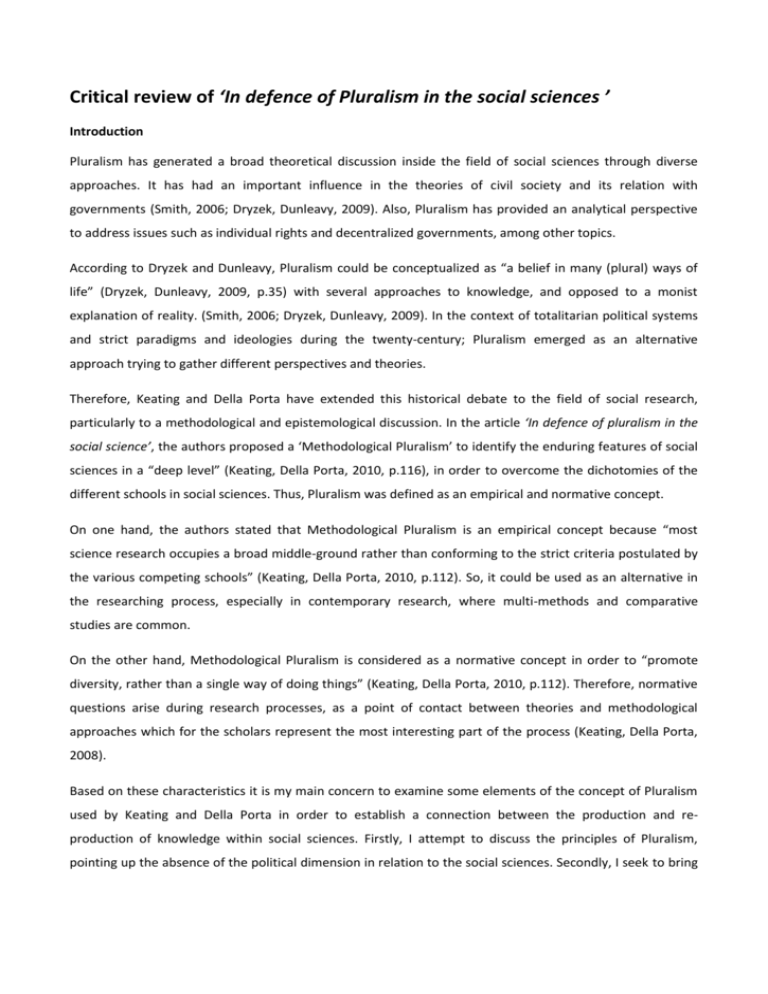
Critical review of ‘In defence of Pluralism in the social sciences ’ Introduction Pluralism has generated a broad theoretical discussion inside the field of social sciences through diverse approaches. It has had an important influence in the theories of civil society and its relation with governments (Smith, 2006; Dryzek, Dunleavy, 2009). Also, Pluralism has provided an analytical perspective to address issues such as individual rights and decentralized governments, among other topics. According to Dryzek and Dunleavy, Pluralism could be conceptualized as “a belief in many (plural) ways of life” (Dryzek, Dunleavy, 2009, p.35) with several approaches to knowledge, and opposed to a monist explanation of reality. (Smith, 2006; Dryzek, Dunleavy, 2009). In the context of totalitarian political systems and strict paradigms and ideologies during the twenty-century; Pluralism emerged as an alternative approach trying to gather different perspectives and theories. Therefore, Keating and Della Porta have extended this historical debate to the field of social research, particularly to a methodological and epistemological discussion. In the article ‘In defence of pluralism in the social science’, the authors proposed a ‘Methodological Pluralism’ to identify the enduring features of social sciences in a “deep level” (Keating, Della Porta, 2010, p.116), in order to overcome the dichotomies of the different schools in social sciences. Thus, Pluralism was defined as an empirical and normative concept. On one hand, the authors stated that Methodological Pluralism is an empirical concept because “most science research occupies a broad middle-ground rather than conforming to the strict criteria postulated by the various competing schools” (Keating, Della Porta, 2010, p.112). So, it could be used as an alternative in the researching process, especially in contemporary research, where multi-methods and comparative studies are common. On the other hand, Methodological Pluralism is considered as a normative concept in order to “promote diversity, rather than a single way of doing things” (Keating, Della Porta, 2010, p.112). Therefore, normative questions arise during research processes, as a point of contact between theories and methodological approaches which for the scholars represent the most interesting part of the process (Keating, Della Porta, 2008). Based on these characteristics it is my main concern to examine some elements of the concept of Pluralism used by Keating and Della Porta in order to establish a connection between the production and reproduction of knowledge within social sciences. Firstly, I attempt to discuss the principles of Pluralism, pointing up the absence of the political dimension in relation to the social sciences. Secondly, I seek to bring forward a debate on knowledge/power relations from the perspective of the Coloniality of knowledge, as a critical approach to a liberal point of view of Pluralism. Beyond the Pluralist perspective of knowledge Keating and Della Porta argue that a Pluralist perspective of social sciences involves a variety of ontologies, epistemologies and methodologies that have multiple “points of connection”, which “cannot be systematized or placed within exclusive schools and pillars” (2010, p.116). Also, the scholars posit that Pluralism does not aim at the creation of a general theory of knowledge, which would imply that the differences between cultures, theories and groups are dissolved into one. On the contrary, they state that different cultures should interact, enriching society and its experiences (Keating, Della Porta, 2010, p.117). Even though this principle of Pluralism is practical and constructive in the process of researching, it possesses a worrying absence of the political dimension of social science, especially if it aims at grasping different realities in order to understand their “complex fields” (Keating and Della Porta, 2010, p.116). Power and Knowledge are strongly related, not only in the sphere of discovery and application, but also in the sphere of the delimitation of the ‘forms’ of ‘truth’ (Martin, 2007; Shiner, 1982). As Foucault pointed out, power relations are multiple and can take different forms, even in the field of sciences (Foucault, 1998). Therefore, knowledge plays a role that can vary in different discursive formations (Foucault, 2011). Thus, It can be called knowledge “to a discursive practice (…); to a place where a subject may take up a position and speak of the objects with which he deals in his discourse (…); it is also the field of coordination and subordination of statements in which concept appear and are (…) transformed”; and so on (Foucault, 2011, p. 201). According to Mignolo, the western modernity – the European project – has captured the production and understanding of knowledge, generating an invisibility of the ideas of the colonies, in a process that he called the colonial matrix of power (Mignolo, 2011; Mignolo, 2009). This idea has been described as having “four interrelated domains: control of the economy, authority, of gender and sexuality, and of knowledge and subjectivity” (Mignolo, 2011, p.8). Likewise, Castro-Gomez states that western epistemology has eliminated the co-existence of the several forms of producing and transmitting knowledge, creating an epistemological scale (Mignolo, 2011; Mignolo, 2009), which takes a linear form starting at zero point – traditional/modern or oriental/western – in an evolutionary pattern. This process, according to the authors, has established Europe and the United States as centers of hegemonic epistemology. Similarly, Foucault criticizes the liberal-humanist separation of knowledge and power, seeking to show the illusion of an apolitical method to knowing (Shiner, 1982), which will be a fundamental argument for my understanding of Pluralism and its role within the social sciences. Moreover, in Gramscian terms, within western epistemology, the geopolitical localization of knowledge production has also developed a subaltern knowledge where hegemony is achieved through a mass concert about what the ‘truth’ is (Martin, 2007). This has resulted in a sort of dependency where “publications [are] created, printed and distributed in the First World” (Mignolo, 2009, p.167), rather than in the geographical area where the research is actually done. This situation illustrates that the geo- and body-politics are hidden in the ‘neutrality’ of the zero point epistemology, where every knowledge, feeling or experience that does not fit the notion of ‘universalism’ is treated as folklore or myth. The narrative of coloniality assumes that “the knowing subject in the discipline is transparent, disincorporated from the known and untouched by the geo-political configuration of the world” (Mignolo, 2009, p.160). At this point, I would like to emphasise the absence of the political dimension in the proposal of the scholars. In ‘Approaches and Methodologies in the Social Science: a pluralist perspective’, Keating and Della Porta – argue that contemporary social science tends to a ‘methodological nationalism’, where the “market of ideas within Europe, and transatlantic trade as the United States has ascended to a dominant position within the social science research world” (Keating, Della Porta, 2008, p.6). Other scholars have stated this situation as well. Norris (1997) points out in his study how the American Political Science Review is a forum where “American political scientists are speaking to each other, but not where the world speaks to American political science”, showing that 92.5 per cent of the authors in its articles were Americans (Marsh, Savigny, 2004). Despite the fact that these statements are widely known, the proposal to diversify the research methods – as does the comparative research in the U.S.A (Sousa, Moses, Briggs, 2010) –does not reveal the problematic behind that market of ideas. On the contrary, it just raises more questions. The market of ideas dominated by these two historically hegemonic fronts constitutes a power relation caused by a process that implies a violent concentration of the world’s resources (Quijano, 2007). This is done through different forms of repression that “fell, above all, over the modes of knowing” (Quijano, 2007, p. 169), even in the perspectives, symbols, and images that knowledge generates. Thus, how is it possible to carry out a Pluralistic methodology – in the terms of Keating and Della Porta – ignoring the dimension of power and domination of knowledge? How is it even possible to develop a “dialectic process of challenge, incorporation and adaptation” (Keating, Della Porta, 2010, p.117) of concepts in the “collective enterprise” (Keating, Della Porta, 2008) of social science if the possibilities of knowledge production lie in an unequal structure dominated by a western epistemology? Pluralism, then, might fall into a simplicity that the authors themselves want to avoid. The scholars argued that the principle of Pluralism is beyond the debate of parsimony and complexity, indicating that this approach is not “merely a matter of humbly accepting the limits of knowledge” (Keating, Della Porta, 2009, p.116). However, they do not provide a clear argument about how it is possible to merge different approaches in order to understand social sciences in a “deep level” without falling into reductionist theories (Keating, 2009). On the contrary, Keating and Della Porta just presented an alternative interpretation of social sciences through methodological solutions to the paradigmatic approach that Pluralism normally criticises. One argument that could explain this lack of reflection on the political dimension of knowledge is that Pluralism is linked to a liberal philosophical trend (Dryzek, Dunleavy, 2009; Smith, 2006), but is also a simplistic explanation since it ignores the power relations of knowledge production – which is not just a matter of political preference. Rather, I consider it an absence of the political response to the colonial matrix of power that Quijano, Mignolo and all the scholars of decoloniality have developed. Pluralism is based on a methodological democratization of knowledge, considering the possibility that everyone can be part of that process, regardless of differences. The problem with this interesting idea lies in its geopolitical localization. Pluralism has been, thought, written and analyzed from the comfort of western epistemology, seeking a sort of ‘neutrality’ where all interpretations are possible, when in fact they are not. Non-neutrality is not possible in social sciences unless it is a “systematic delocalized knowledge” (Martin, 2007, p. 89) that avoids the ideas of local history and local interests in the process of knowing. According to Keating, the professionalization of political science has established a single paradigm where there is a “mania for competitive citation rankings and the pressure to recognize a hierarchy of journals” (Keating, 2009, p.17), particularly in the USA. Therefore, he appeals for a more self-reflective, innocative discipline with stronger interactions with other disciplines. Consequently, Pluralism does not break, neither epistemologically nor methodologically, with the logic of coloniality of knowledge, making the very sense of plurality itself lose meaning. On the colonial matrix of power, Pluralism facilitates the domains of the construction of sorts of knowledge and subjectivity that it are not interested on a broad self-reflective process, actually involving the dimension of the ‘other’ with a political compromise. The dimension of the ‘others’ outside Europe is constantly absent in western social sciences (Quijano, 2007), as it is the political dimension. Center/peripheral knowledge The power-knowledge relation and the domains of western epistemology have revealed the need for a political and epistemic delinking (Mignolo, 2009), which involves a process of decolonization of the thought. This process does not intend to reject the contribution that western epistemic has made so far; but instead to carry out an appropriation of its contributions in order to “de-chain” (Mignolo, 2011) the knowledge from its colonial backgrounds. As it was mentioned above, Pluralism is still tied to its liberal and western analytical background, limiting its possibility of successfully achieving its objective of a more inclusive and reflective social sciences. Therefore, the process of appropriation of concepts could be an interesting approach to establish a decolonial knowledge. According to Burns, “appropriations have no interest in the intentions of the author, or the meaning which a text has for the person who wrote it. Nor are they interested in the ‘truth’” (Burns, 2011, p. 317). Likewise, appropriation is the possibility of using, de-forming and re-forming concepts or theories with the purpose of developing them and making them our own (Burns, 2011). In addition, epistemic delinking starts by accepting the interconnection between geo-history, geography and epistemology in the way that Mignolo presented it: ‘I am where I think’ (Mignolo, 2011, p. 91). The recognition of both geopolitical and body-political elements is fundamental to apply an epistemological disobedience (Mignolo, 2009). In the first place, geopolitical localization of knowledge lets us understand that the ideas are created in a context, within particular material conditions - mainly defined by an economic, political and cultural structure - which necessarily affect the way we know the world. Secondly, and according to Mignolo, body-politics is described as the biographic configuration of gender, religion, class, ethnicity and language (Mignolo, 2011), which is enacted by bodies that have been dehumanized by colonial technologies (Quijano, 2009). Similarly, Jenkins states that the concrete effects of power-knowledge relations are inscribed on human bodies, since “the body has been constructed as an object that can be manipulated, controlled and indeed ‘disciplined’” (Jenkins, 2005, p. 4). Therefore, a delinking epistemology needs the recognition of the body-politics; where dominated (alienated) bodies could realize their respective situations and free themselves from it as a form of awareness and appropriation of their own development of ideas and knowledge. Thus, a real epistemological democratization engages a ‘pluriversal’ (Mignolo, 2011) decolonization of democracy, disconnected from personal-political-economic interests of a type of dominant knowledge. A pluralistic social science is not enough, it is necessary a pluralistic society where knowledge-power relations be decolonized. Following Mignolo and decolonial theories, the concentration of decision-making power in the sphere of economy, especially in the polycentricity of capital accumulation – that characterizes neoliberalism – has brought a more devastating cost for the planet (Mignolo, 2011; Quijano, 2009) in environmental, violence and exploitation issues. Likewise, Pluralism – as a concept and theory – could be a possible alternative if it considered the historical diversity and the heterogeneity of every society, not just a distorted conception of epistemology that guarantees the liberating promise of western modernity. At this point, I would like to take the theory proposed by the decoloniality a step forward, by appropriating – in terms of conceptual appropriation (Burns, 2011) - part of the theory of localization, developed by the urban sociologist Saskia Sassen. Broadly speaking, she has developed the idea that the process of globalization has led to a multiplication of the center-periphery systems, connected by means of economic and power relations (Sassen, 2005; Sassen, 2000). Therefore, traditional centers that dominated the economic system, as New York or London, “have altered the spatial correlates of centrality” (Sassen, 2005, p.75), to other centers. That is why, today we can observe periphery with centers and centers with periphery in constant connection. According to Sassen, “the geography of centrality and marginality, which in the past was seen in terms of duality of highly developed and less developed countries”, it is possible to see “that peripheralization process are occurring inside areas that were conceived as a ‘core’ areas” (Sassen, 2000, p. 140). Therefore, even though, the theory of localization of the centers is suitable for an economic and urban analysis, we can understand it from the geopolitical dimension of knowledge (Knaub, 2012). Decolonial theory points this out, but it does not expose that within the colonizing countries – with a clear western epistemology – there is also a colonization of the knowledge and power relationships, where certain educational centers have more and better opportunities to produce knowledge than others. Thus, if we look at the European scene, the United Kingdom or Germany represents the center, while eastern European countries remain in the periphery. In the same way, among the countries that were colonized, there is this center-periphery relationship, since the production of knowledge is relegated to intellectual elites that are for the most part connected with the centers of the countries that were colonists. Likewise, geopolitical knowledge it is distributed in global, regional and local (Sassen, 2000) areas, where relations of power shape the production and re-production of knowledge. Finally, an epistemic disobedience and a decolonial knowledge are only possible when this power relation between centers and peripheral knowledge is acknowledged by scholars in order to rise other problematic questions within social sciences. Therefore, when Keating and Della Porta putted under discussion the future of European social science and it plural role, it is also important to add a discussion of the purpose of social science, and specifically the role of political science, and how these knowledge can shape the conduct and direction of what it is thinking about society. No Pluralism is possible if real heterogeneity of society is hidden behind a liberal democracy that is embedded in a hegemonic structure, and also no Pluralism is possible if it is still absent the political dimension of social sciences. As Knaub points out, the aim of social science it is to recognize its social and political role and reveal its historicity as it critical and practical role in the social transformation (Knaub, 2012). This aim, it is not longer responsibility of European or American sciences only, it is a worldwide situation that it could reach the freedom of social sciences of the rational, western an colonial thought that has persisted for years. References Burns, Tony (2011) Interpreting and appropriating texts in the history of political thought: Quentin Skinner and poststructuralism, Vol. 10, 3, pp. 313-331. Dryzek, John; Dunleavy, Patrick (2009) Theories of the Democratic State, Palgrave Macmillan, UK. Foucault, Michel (2011) Archeology of Knowledge, Routledge Classic, London. Foucault, Michel (1998) Aesthetic, Methods and Epistemology: Volume two, Penguin Books, London. Jenkins, Laura (2005) Corporeal Ontology: Beyond Mind-Body Dualism? Politics, Vol. 25(1), pp. 1-11. Keating, Michael; Della Porta, Donatella (2010) In defence of pluralism in the social sciences, European Political Science, n. 9, pp. 111-120. Keating, Michael; Della Porta, Donatella (2008) Approaches and Methodologies in the social sciences: a pluralist perspective, Cambridge University Press. Keating, Michael (2009) Putting European political science back together again, European Political Science Review, 0:0, pp. 1-20. KnauB, Stefan (2012) ¿Hay una filosofía postcolonial en America Latina? Fuentes y argumentos de la contrahegemonía, Astrolabio, Revista Internacional de filosofía, Num. 13, pp.219-226. Marsh, David; Savigny, Heather (2004) Political Science as a Broad Church: The Search for a Pluralist Discipline, Politics, Vol. 24(3), pp. 155-168. Martin, Linda (2007) Mignolo’s Epistemology of Coloniality, The New Centennial Review, Volume 7, Number 3, pp. 79-101 Mignolo, Walter (2011) The Darker side of western modernity: global futures, decolonial options, Duke University Press, London. Mignolo, Walter (2009) Epistemic Disobedience, Independent Thought and Decolonial Freedom, Theory, Culture Society, Vol. 26(7-8), pp. 159-181. Quijano, Anibal (2007) Coloniality and Modernity/Rationality, Cultural Studies, Vol.21, pp.168-178. Sassen, Saskia (2000) Cities in a World Economy, Second Edition, Pine Forge Press, London. Shiner, Larry (1982) Reading Foucault: Anti-method and the genealogy of power-knowledge, History and Theory, Vol. 21 (3), pp. 382-398. Sousa, Luis; Moses, Jonathon; Briggs, Jacqui; Bull, Martin (2010) Forty tears of European political science, European Political Science Review: 9, p. 1-10. Smith, Martin (2006) Pluralism, in The Sate: Theories and Issues, Ed. Hay, Listen and Marsh, Palgrave Macmillan. UK.
